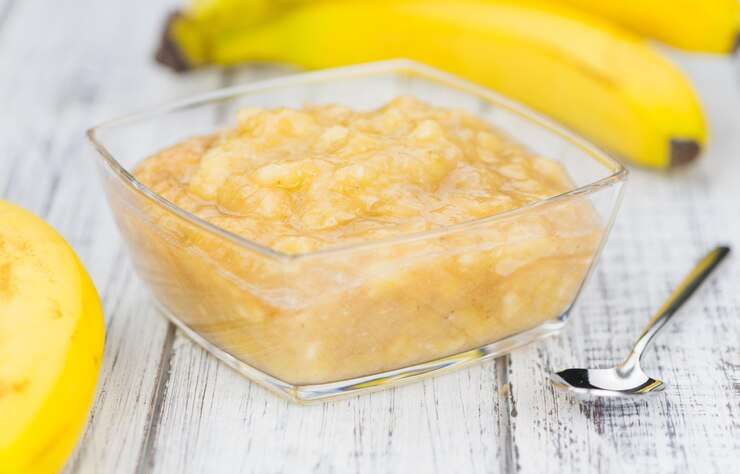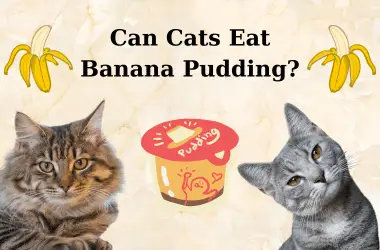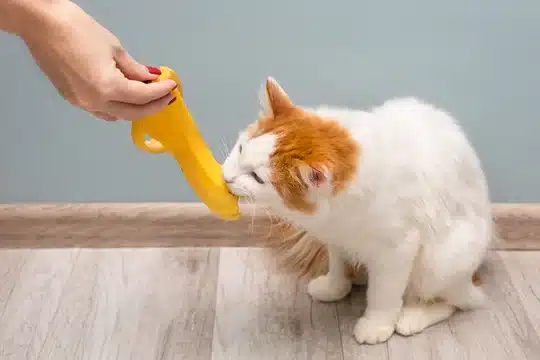Introduction

image credit: Freepik
One of the most well-liked and well-known fruits is the banana. They are tasty despite being basic. Although we witness monkeys consuming this food, what about other animals?
Can cats eat banana pudding? The answer is no. For cats to remain strong and healthy, a diet rich in protein is essential. Protein content is low in bananas.
Don’t worry if you’re looking for a detailed explanation of why banana pudding can upset your pet’s digestive system. This pudding-focused feature focuses on the kinds of pudding that your small pet can safely eat or should avoid.
Table of Contents
Can Cats Eat Banana Pudding?

Cats are not allowed to eat banana pudding, as I previously stated. Never give a cat or kitten something to eat that you wouldn’t eat for yourself.
While milk is not advised for cats to consume while pregnant or nursing, bananas are safe for cats to eat.
That suggests that since the original recipe calls for no eggs, you will need to make a modification if you are trying it for the first time.
Read More Interesting Topics
Is it okay to eat banana pudding for cats?
Fruit is nutrient-dense and packed with beneficial vitamins and minerals, but banana pudding is meant to be a complete meal for your cat, not just a treat. They include potassium and vitamins B6, C, D, and E, all of which are necessary to support healthy brain function and to preserve overall health and immunity.
However, a recipe for banana pudding meant for humans contains sugar, which shouldn’t be allowed in a cat’s diet.
Let’s examine what banana pudding is and how it affects your cat’s body to help you understand why cats shouldn’t eat it.
Extract from Vanilla
Vanilla extract is a no-no for cats.
Vanilla extract contains ethyl alcohol, which is toxic to felines. This is the result of alcohol poisoning, which can have symptoms as severe as vomiting, lethargy, and even coma.
Milk For Cats
Across the world, a lot of cat parents enjoy giving their cats milk to increase the amount of calcium in their diet.
Like other young mammals, kittens are born unable to process the sugar lactose found in milk. Because of this, kittens are able to nurse from their mothers, who use lactose to produce lactic acid, which serves as the kittens’ energy source.
However, by the time they are 6 to 8 weeks old, kittens can start eating solid foods and are less and less dependent on their moms.
After consuming milk, particularly cow’s milk, adult cats are more likely to experience stomach problems. This can result in a severe upset stomach and diarrhea. The way that humans and cats process food is relatively similar, but there are some distinctions in cat nutrition.
A stomach ache can result from giving a kitten or adult cat too much of anything, including milk.
Banana For Cats
When adding bananas to a cat’s diet, avoid making banana pudding, as it doesn’t seem to help with coat quality. Bananas are not the best food to give your cats, even though they are very beneficial to humans.
This is caused by the amount of potassium it contains, in addition to the fact that cats are not able to properly digest it.
Unlike humans, cats do not require a diet high in potassium because this mineral can cause serious health issues, such as kidney failure.
Their primary diet, which primarily consists of meat and other easily digested building blocks, provides them with everything they need. You should probably give it to your cat a taste of your dessert if they like to lick the spoon or the fro-yo dish while you are preparing dinner.

image credit by Freepik
Pudding or Custard Mix for cats
The key ingredient in custards in general and banana pudding in particular is custard.
It can cause severe stomach pain if a cat ingests milk, especially cow’s milk, whether you make your own custard or use a pre-packaged custard mix.
Although it isn’t a component of the custard mix itself, vanilla extract is frequently added as a flavoring to commercially made custard mixes. Eggs are also necessary for custards, but if cats eat them, their sensitive stomachs may become irritated and they may get diarrhea.
A few licks won’t hurt anything, but if your cat consumes too many custards, it can become seriously unhealthy.
Are vanilla wafers edible for cats?
Banana pudding frequently contains vanilla wafers as an ingredient. Regretfully, vanilla wafers are not edible for cats either. These treats are toxic to cats because they contain sugar, leavening, salt, and artificial flavors.
You can include all of these in the list of foods cats should not eat. Maybe you’ve been giving your pet vanilla wafers every now and then as a treat. Now that you are aware that cats shouldn’t eat these, search for something more suitable for cats.
If my cat eats banana pudding, what should I do?
Every cat owner has felt the wrath of the devil at some point, particularly when their furry friend requests a taste of whatever it is they are eating.
It’s probably not a huge deal if your cat eats some of your banana pudding. You should keep an eye out for any strange behaviors, but small amounts shouldn’t hurt your pet right away.
Any higher amounts, though, might be cause for alarm. One of the ingredients, vanilla extract, is toxic to cats, so it’s possible that your pet will show symptoms of alcohol poisoning.
Conclusion
Can cats eat banana pudding? It is not advisable for your cats to consume banana pudding. Although eating bananas won’t harm your cat, they do contain pectin, a soluble fiber that may cause digestive problems. If your cat consumes too many bananas, they will become poisonous due to the ethyl alcohol they contain.
Cats that consume banana pudding may exhibit symptoms of flatulence, vomiting, or diarrhea. If your cat consumes a lot of it, though, it might cause more serious symptoms like depression, appetite loss, breathing problems, and tremors.
Ensure that the food your cat eats is cat food that has been specially prepared for felines.
FAQS: Can Cats Eat Banana Pudding?
1. How come cats can’t eat bananas?
Bananas are not poisonous to cats, but feeding them on a regular basis is not advised. Because of their high sugar content, bananas can cause weight issues and diabetes.
2. How much banana can cats safely eat?
In general, treats should make up no more than 10% to 12% of a cat’s daily caloric intake, and bananas are high in calories. Limiting yourself to a 1-inch square of banana every few weeks would be a prudent rule of thumb.
3. Is pudding safe for cats?
Pudding is not safe for cats. While it might seem harmless to share a sweet treat like vanilla pudding with your feline friend, there are several reasons to avoid doing so:
Vanilla pudding contains ingredients that can negatively impact cats. Here are some gradients:
- Milk:
- Butter:
- Sugar:
In summary, it’s best to keep pudding away from your furry family member and opt for healthier alternatives instead.
4. Why can’t cats eat bananas?
Cats can eat bananas, but it’s essential to exercise caution. While bananas are not toxic to cats, they should be given in moderation. Here’s why:
- Sugar Content:
- Digestive Enzymes:
Remember, bananas are not a natural part of a cat’s diet, so it’s best to offer them as an occasional treat rather than a regular snack.


